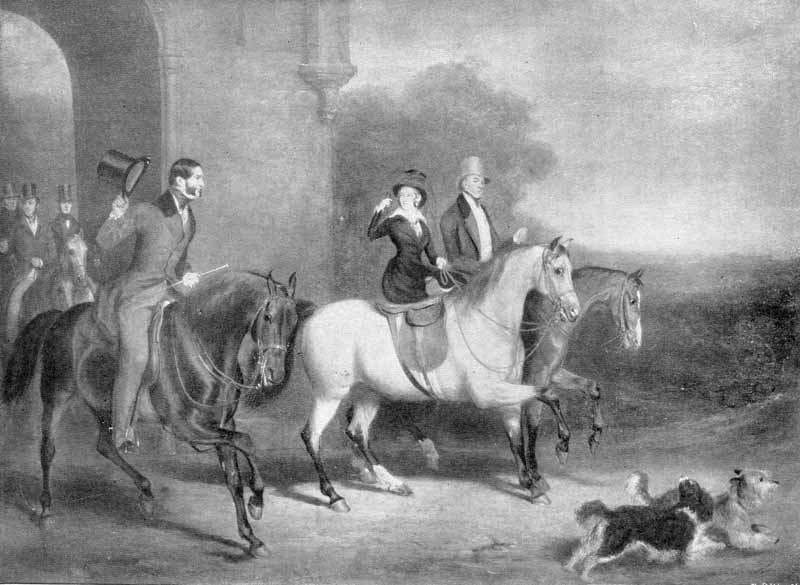
HER MAJESTY THE QUEEN in 1839, Attended by Viscount
Melbourne, the Marquis of Conyngham, who raises his
hat, the Hon. George S. Byng, the Earl of Uxbridge,
and Sir George Quinton.
THE
ardour and intelligence with which the Queen applied
herself to master the details of ceremony and
business incident to her position at the head of a
great Empire, did not protect her from censorious
and even malicious criticism. It was natural,
perhaps, that the exclusive confidence reposed by
Her Majesty in Lord Melbourne should excite the
jealousy of others, whose exalted rank gave them
what they considered a superior claim to access to
the presence.
Lord
Melbourne's constant attendance at Court had
compelled him to change his demeanour in a very
remarkable degree. Hitherto, his affectation had
been to conceal all traces of seriousness in
transacting business he would sprawl on a sofa, blow
a feather about the room, balance a chair, or dandle
a cushion while receiving deputations - the very
incarnation of indolence - to the despair of those
who anxiously desired to engage his attention, and
who could scarcely be persuaded by those who knew
him best that he had spent strenuous hours in
getting up the subject under discussion, was
perfectly acquainted with all its details, and was,
besides, listening most attentively to all that was
said. His physician, Dr. Copeland, knew how really
hard the Prime Minister worked, and told Bishop
Wilberforce that he (Melbourne) used to transact
business all day in his bedroom with his secretaries
in order that bores might be dismissed with the
information that " my lord had not yet left his
bedroom."
But
besides this tiresome frivolity of manner, there was
another habit in regard to which Melbourne had to
put severe restraint on himself in the Royal
presence. It had been his custom to season his
conversation with a multitude of indecorous oaths.
Mr. Denison (afterwards Speaker, and subsequently
Viscount Ossington) spoke to him one day about some
points in the Poor Law Bill, then under
consideration. Melbourne was just going out for a
ride, and referred Denison to his brother George. "
I have been with him," replied Denison, " but he
damned me, and damned the Bill, and damned the
paupers." " Well, damn it ! what more could he do ?
" quoth Melbourne, and rode off.
In
spite of all his affectation and a degree of
underlying weakness, this Minister performed a
singularly valuable public service to his country in
the support and advice he afforded the Queen at the
most critical time of her life ; a service that was
explicitly and handsomely acknowledged in the House
of Lords by his chief opponent there, the Duke of
Wellington, in 1841.